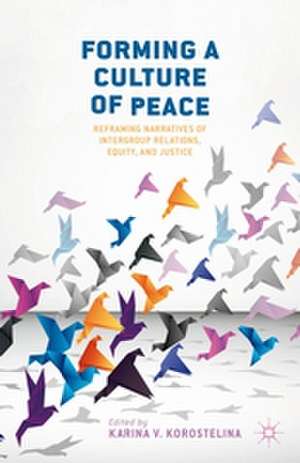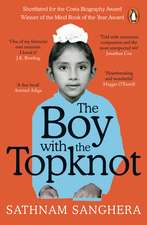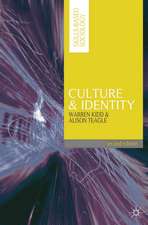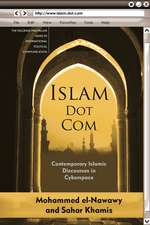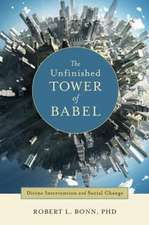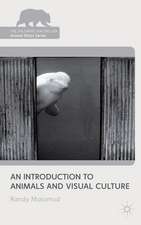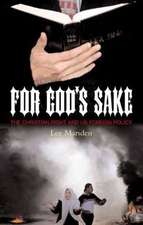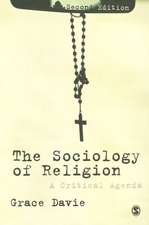Forming a Culture of Peace: Reframing Narratives of Intergroup Relations, Equity, and Justice
Editat de K. Korostelinaen Limba Engleză Hardback – 24 apr 2012
| Toate formatele și edițiile | Preț | Express |
|---|---|---|
| Paperback (1) | 385.25 lei 6-8 săpt. | |
| Palgrave Macmillan US – 24 apr 2012 | 385.25 lei 6-8 săpt. | |
| Hardback (1) | 389.88 lei 6-8 săpt. | |
| Palgrave Macmillan US – 24 apr 2012 | 389.88 lei 6-8 săpt. |
Preț: 389.88 lei
Nou
Puncte Express: 585
Preț estimativ în valută:
74.61€ • 79.78$ • 62.20£
74.61€ • 79.78$ • 62.20£
Carte tipărită la comandă
Livrare economică 17 aprilie-01 mai
Preluare comenzi: 021 569.72.76
Specificații
ISBN-13: 9780230340138
ISBN-10: 023034013X
Pagini: 284
Ilustrații: XI, 284 p. 2 illus.
Dimensiuni: 140 x 216 x 20 mm
Greutate: 0.46 kg
Ediția:2012
Editura: Palgrave Macmillan US
Colecția Palgrave Macmillan
Locul publicării:New York, United States
ISBN-10: 023034013X
Pagini: 284
Ilustrații: XI, 284 p. 2 illus.
Dimensiuni: 140 x 216 x 20 mm
Greutate: 0.46 kg
Ediția:2012
Editura: Palgrave Macmillan US
Colecția Palgrave Macmillan
Locul publicării:New York, United States
Cuprins
PART I: DEFINING DISCOURSES OF PEACE Reframing Public Discourses for Peace and Justice; M.Karlberg The 'New' Rhetoric: Keeping Time in the Communication of Peacebuilding; R.Hart Toward Popular Discourses of Peace; R.Rubenstein Promoting Culture of Peace through History Education; K.V.Korostelina Becoming a Peacemaker: Personal Discourses of Peace and Violence; M.Gopin PART II: COMMUNICATING PEACE The Discursive Construction of Global Poverty: Social Justice in Patterns of Reporting; M.Milner Civil Identity and Communicative Practice: the Rhetoric of Liberty in the United States; S.Simmons Conflict Prevention, Reconciliation and Mass Media Framing; B.Bahador Why Can't You Sell Peace Like You Sell Soap? Social Marketing: An Approach to Communication for Peace in Aceh; V.Rish The Importance of Communication in Civil-Society Peace Building. An Example Taken from the Field; H.Neumann & M.Emmer
Recenzii
"This excellent collection of insightful chapters reveals the multiple ways that values, beliefs and practices
which are supportive of peace, justice, and equality, are socially communicated. The varied, empirically-grounded
analyses demonstrate how many social levels should be, and often are, engaged in forming a culture of peace." - Louis Kriesberg, Professor Emeritus of Sociology, Maxwell Professor Emeritus of Social Conflict Studies, Founding Director, Program on the Analysis and Resolution of Conflicts, Syracuse University
"Karina V. Korostelina has gathered some important authors in the field to focus attention on the ways in which different discourses, narrative frames, and systems of values and beliefs support and promote violence and conflict and how these might be challenged by different ways of framing and communicating peace. The authors highlight the malign effects of negative enemy imaging and explore how different frames/discourses can be developed that will generate more positive alternatives for societies, nations, and a global system seeking to live in harmony in a rapidly shrinking world. What is particularly welcome is the stress on injustice and inequality and the need to rethink what sorts of discourse will most advance more just and equal communities. This is a must-read for anyone interested in the nuts and bolts of building a culture of peace in a world still depressingly addicted to violence and war.' - Kevin P. Clements,professor and director, National Centre for Peace and Conflict Studies, the University of Otago
"Any readers who thought of the 'Culture of Peace' as a soft concept beware - this book will change your mind. Korostelina and her colleagues have developed the implications of the concept, nailed down its implementation for freedom, justice, and equality work, and, as a bonus, have looked at the communications strategies that can effectively market the work - a need that is too often forgotten." - Mari Fitzduff, professor, Masters Program in Coexistence and Conflict, Brandeis University
which are supportive of peace, justice, and equality, are socially communicated. The varied, empirically-grounded
analyses demonstrate how many social levels should be, and often are, engaged in forming a culture of peace." - Louis Kriesberg, Professor Emeritus of Sociology, Maxwell Professor Emeritus of Social Conflict Studies, Founding Director, Program on the Analysis and Resolution of Conflicts, Syracuse University
"Karina V. Korostelina has gathered some important authors in the field to focus attention on the ways in which different discourses, narrative frames, and systems of values and beliefs support and promote violence and conflict and how these might be challenged by different ways of framing and communicating peace. The authors highlight the malign effects of negative enemy imaging and explore how different frames/discourses can be developed that will generate more positive alternatives for societies, nations, and a global system seeking to live in harmony in a rapidly shrinking world. What is particularly welcome is the stress on injustice and inequality and the need to rethink what sorts of discourse will most advance more just and equal communities. This is a must-read for anyone interested in the nuts and bolts of building a culture of peace in a world still depressingly addicted to violence and war.' - Kevin P. Clements,professor and director, National Centre for Peace and Conflict Studies, the University of Otago
"Any readers who thought of the 'Culture of Peace' as a soft concept beware - this book will change your mind. Korostelina and her colleagues have developed the implications of the concept, nailed down its implementation for freedom, justice, and equality work, and, as a bonus, have looked at the communications strategies that can effectively market the work - a need that is too often forgotten." - Mari Fitzduff, professor, Masters Program in Coexistence and Conflict, Brandeis University
Notă biografică
Karina V. Korostelina is Director of the Program on History, Memory and Conflict at the School for Conflict Analysis and Resolution, George Mason University, USA.
